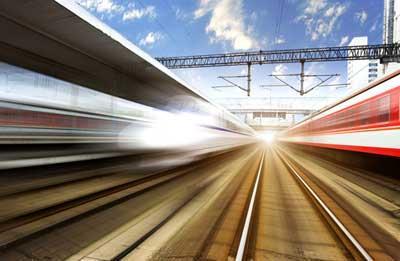
An end-to-end city delivery scheme between the East Midlands, Yorkshire and London that combines rail trunking with low-emission first and last-mile journeys is expanding.
The ‘London Link’ was launched in 2011 as a partnership between logistics firm 5PL (UK) and Wego Carbon Neutral Couriers.
It sees goods collected for first and last-mile legs by cycle courier or electric van from centres in Yorkshire, the East Midlands and London and transported on its trunk journey on passenger trains.
Jeff Screeton, MD at 5PL (UK), told FreightintheCity that the success of the scheme had prompted the government to declare it wanted to see the initiative grow.
The company is now in advanced talks with a number of train operators that will see its network take in other major UK centres from the North East to the South West.
He added that the speed and frequency of rail would bring new opportunities to SMEs in the regions, particularly those wishing to send time-sensitive deliveries to the capital, such as fresh seafood, engineering components, pharmaceuticals and flowers for example.
It would also provide a new option for the e-commerce sector, providing cost-effective deliveries for same-day ordering.
Need for speed
The service has already been successful in its time-critical collection and delivery of samples for clinical trials, where the speed of rail has reduced drug validation time by up to 30%, with samples travelling to London up to four times per day.
5PL, with its partner Retail Project Support Services, is also investigating the potential to launch a service for major retailers and carriers requiring deliveries into London. This would see the launch of high-speed, shared-user bulk trains and urban hubs created at stations for cross-docking purposes, again combined with low-carbon transport for the final mile.
These services will be open to all users of overnight freight services from companies shipping volumes of cages/pallets right down to those wanting delivery of a single parcel.
Screeton said: “Utilising rail in this way yields many benefits but principally its timetabled nature enables much more effective first/last-mile planning and a reduction in wasted time, mileage and pollution. We can offer a much more flexible service and much later cut-off times than standard carriers”
He added that since its launch over four years ago, the existing operation has not lost or damaged a single item. “Our current service level stands at 99.98% - the missing 0.02% being attributable exclusively to emergency line closures.”














![DP World Modal Shift Programme Image[72690]](https://d2cohhpa0jt4tw.cloudfront.net/Pictures/100x67/4/9/7/17497_dpworldmodalshiftprogrammeimage72690_781836.jpg)